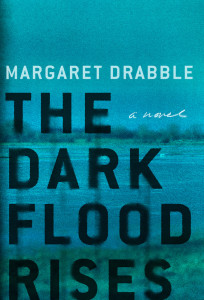
In her seventies, Francesca Stubbs likes being busy and likes driving. When tailgated, she chooses the accelerator rather than the brake, which pretty much describes her philosophy of life.
Her job inspecting care homes for the elderly keeps her crisscrossing the country when she’s not at home in London. “England is now her last love. She wants to see it all before she dies. She won’t be able to do that, but she’ll do her best.”
The nearness of death is ever-present in this 2016 novel. The title comes from one of the epigraphs, from ‘The Ship of Death’ by D.H. Lawrence: “Piecemeal the body dies, and the timid soul has her footing washed away, as the dark flood rises.”
There is actual flooding as well, in the Somerset Levels where she gets stuck going to a care home in February. The Canary Islands, where her newly widowed son visits an elderly writer and his young partner, is also threatened with floods from the minor earthquakes.
The novel moves between Francesca, her son, the couple in the Canaries, her elderly friends in various states of health, and several others, moving in an organic way that feels similar to following threads on the internet, reflecting Francesca’s inability to focus.
To the surprise of her friends and grown children, she’s chosen a flat in a high rise in a dodgy part of town because she likes the view. They are also surprised that she spends considerable thought and time making and delivering meals to her invalid ex-husband, a retired surgeon happy to consume prescription drugs, drink wine, and listen to Maria Callas all day.
Still, this exploration of aging is anchored by Francesca as she meets with the residents of various care homes, worries about her children, and visits her friends with whom she can laugh about the past and complain about the obituaries of other friends.
Her wry, self-deprecating sense of humor keeps the story from becoming too dark. For example, she sometimes “exercises herself by trying to recall the passionate and ridiculous emotions of her youth and her middle age, the expense of spirit in a waste of shame.” More often she recognises that “she doesn’t need to worry about bloodstains on the skirt, though she worries now about the soup stains on her cardigan, the egg yolk on the dressing-gown lapel.”
Drabble’s masterful use of the omniscient point of view complements the story. Most novels these days use first person or close third point of view, with lots of dialogue, jump cuts, and action. Here, even scenes are narrated, evoking a slightly old-fashioned air. Yet they crackle with wit and insight as we begin to appreciate the web of associates and associations that make up a life, past and present. I found myself setting aside my to-do list in order to stay immersed in this story.
Do you have a favorite Margaret Drabble novel? Have you read a good novel about aging?